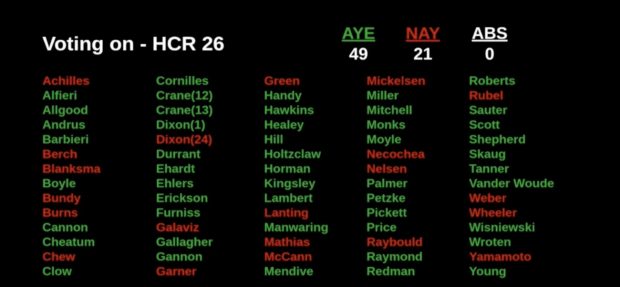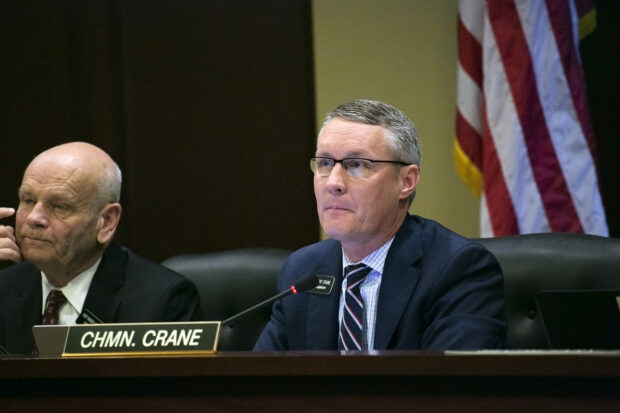Bristling over a closed-door process — and asserting their say in a transformational transaction — House members voted overwhelmingly to slow the University of Phoenix acquisition.
On a 49-21 vote, the House passed a resolution urging the State Board of Education to reconsider the $685 million Phoenix purchase. The resolution also gives legislative leadership the green light to take the issue to court.

The resolution — and the specter of a lawsuit — casts another foreboding cloud over the University of Idaho’s planned Phoenix acquisition. Attorney General Raúl Labrador is already taking the State Board back to court; the Idaho Supreme Court will hear oral arguments in his open meetings lawsuit in June. A legislative lawsuit, while separate, could also bring the Phoenix bond issue to a grinding halt.
U of I and State Board officials have said they cannot issue bonds while the Phoenix purchase is mired in court. And with a nonbinding May 31 opt-out date less than three months away, they have said the legal challenges could kill the deal.
Tuesday’s debate centered on the lawsuit threat — which appears in the final and strongest paragraph in the three-page House Concurrent Resolution 26.
Supporters said the Legislature was left with no recourse. Rep. Wendy Horman, R-Idaho Falls, noted that the U of I and Phoenix already has a contract for a sale.
“We can’t pass legislation to impair the execution of that contract,” she said.
Opponents said lawmakers should not write a blank check for a taxpayer-funded lawsuit.
“We’re a body capable of action,” said Rep. Britt Raybould, R-Rexburg. “I do not think our default position … should be to go to the courts.”
Tuesday’s House vote came more than nine months after the State Board approved the Phoenix purchase — in a hastily called public meeting that left most legislators off-guard. During Tuesday’s floor debate, some lawmakers did nothing to hide their displeasure.

House State Affairs Committee Chairman Brent Crane — a co-sponsor of the resolution — chided U of I President C. Scott Green. During committee meetings last week, Green repeatedly said there was no political mechanism for the U of I to give legislators advance word about a purchase.
“I have a cell phone and I have a laptop,” said Crane, R-Nampa.
Rep. Barbara Ehardt said she listened to last week’s hearings, and said lawmakers were given a series of “evasive” answers. “We owe this to our taxpayers,” said Ehardt, R-Idaho Falls.
But Rep. Lori McCann accused her colleagues of “meddling” in an established process, which allows colleges and universities to craft policy by going through the State Board.
McCann, R-Lewiston, represents the U of I campus, and she says she went directly to Green for answers about Phoenix. McCann said she is convinced Phoenix will protect the U of I from a demographic cliff: a steep, looming drop in traditional college-aged students.
“I believe the University of Idaho is thinking outside the box.”
The U of I did not immediately respond to a request for comment on Tuesday’s vote. Through spokesman Mike Keckler, the State Board expressed disappointment.
“We had hoped for a different outcome today in the House,” he said. “However, the board has been and is willing to cooperate fully with the Legislature as it considers matters related to the proposed affiliation between the University of Idaho and the University of Phoenix.”
The resolution now heads to the Senate.
House Ed members push for funding for higher ed pay raises
A recurring theme surfaced as the House Education Committee delved into the higher education budget.
Lawmakers on both sides of the aisle said the state should do more to help colleges and universities provide pay raises.
The Legislature is looking at two rounds of raises this year: a 1% increase for all state employees, and a 2% increase in merit pay. But the state doesn’t fully fund pay raises for colleges and universities, and they are expected to use tuition and fees to cover the balance.
The state’s four-year schools would need $3.8 million to fully fund the pay raises, State Board of Education executive director Matt Freeman told the committee. The cost for the community colleges would come to about $1.6 million.
Colleges and universities aren’t the only state agencies who have to cover a share of their pay raises. But there is a difference between increasing a user fee to cover pay raises, and expecting college students and parents to shoulder the cost, said Rep. Lori McCann, R-Lewiston.
McCann said the Legislature should fully fund higher ed pay raises. Rep. Steve Berch, D-Boise, suggested going a step further. He said the state should fully fund all higher ed salaries, and slash tuition costs accordingly.
In the meantime, however, lawmakers could get a chance to vote on a more modest approach: a line item for discretionary higher education dollars. If funded, the “operational capacity enhancement” could cover pay raises, especially at Boise State University and several community colleges, Freeman said.
The four-year schools could receive nearly $7 million in this line item; the four-year schools would stand to receive $1.3 million.
House Education chairwoman Julie Yamamoto, R-Caldwell, is scheduled to speak to the Joint Finance-Appropriations Committee Wednesday, outlining her committee’s spending priorities for K-12 and higher education. JFAC is expected to write a followup higher education budget in the next few days — a budget that would address pay raises and the operational capacity enhancement line item.
Civics education proposal heads to House floor
After some brief fireworks, a proposal promoting civics education is headed to the House floor for a final vote.
The proposal encourages the Idaho Department of Education to promote studies of “the history of western civilization, civics education, and responsible citizenship.”
“We have to understand what has made other nations great, and what has brought them down,” said Rep. Tony Wisniewski, R-Post Falls, who is co-sponsoring Senate Concurrent Resolution 116 with Sen. Cindy Carlson, R-Riggins.
SCR 116 — like a separate resolution encouraging age-appropriate Holocaust education — comes as the state is conducting a five-year review of social studies standards.
“It’s perfect timing for both of these things,” said state superintendent Debbie Critchfield.
The resolution ran into some resistance, when Rep. Steve Berch asked the co-sponsors why the word “democracy” appears nowhere in the resolution. Wisniewski and Carlson both said the United States is a republic, not a democracy — answers that left Berch visibly frustrated.
“People died for American democracy,” said Berch, D-Boise.
The House Education Committee approved the resolution, with only Berch in opposition.
Bill blocking abortion providers from furnishing sex education material advances
A bill that would bar abortion providers from giving sex education material to schools is heading to the House floor.
The bill closes a loophole in the “No Public Funds for Abortion Act”, said David Ripley, executive director for Idaho Chooses Life, an anti-abortion advocacy group. The existing law prohibits school and university facilities from being used to provide or advocate for abortion.
But abortion providers still might be able to provide curriculum to public schools as long as they don’t charge for it, Ripley said. “We want to close that loophole, because it represents a threat to the well-being of children and the safety and security of families.”
The House State Affairs Committee advanced the bill on a party-line vote.
Just one person testified against it. Mistie DelliCarpini-Tolman, Idaho state director for Planned Parenthood Alliance Advocates — West, said the bill would narrow the pool of qualified sex educators. “This limits young people’s access to comprehensive sex education that is vital for their health and safety.”
Rep. Todd Achilles, D-Boise, worried the bill would hinder medical institutions, like St. Luke’s Health System, from engaging with students. Ripley responded that it wouldn’t. “They are providing legitimate health care, and I don’t believe they would qualify as an abortion provider under the terms of this bill,” he said.
The bill says public schools can’t allow an organization “that is a provider of abortion” to furnish sex education material, and the “No Public Funds for Abortion Act” defines abortion as terminating a pregnancy unless it’s unviable. But Idaho law also allows health care providers, like St. Luke’s, to perform an abortion if it’s necessary to save the life of a mother or if the pregnancy resulted from incest or rape.
Update to school board vacancies, recall elections heads to House
A proposal to update laws governing school board quorums and recall elections is heading to the House floor.
House Bill 645 would:
- Define a board quorum as a majority of current board members, rather than a majority of board seats;
- Clarify that a board vacancy is official when a county commission certifies a recall election; and,
- Bar recalled trustees from voting on board contracts between a recall election day and the county commission’s election certification.
The bill addresses an issue that cropped up in Bonner County last year. The West Bonner School Board tried to hold a special meeting to consider contracts days after two trustees were recalled but before the election was certified.
“That brief period of time, we would suspend all very high-level decisions from the board members that are subject to recall,” said Rep. Mark Sauter, R-Sandpoint, who’s sponsoring the bill.
The Senate passed a similar bill last month. Sauter said his bill is “more comprehensive.” The other version, sponsored by Sen. Scott Herndon, R-Sagle, was assigned to the House Education Committee, where it won’t have a hearing, said State Affairs Chairman Rep. Brent Crane, R-Nampa.
House passes bills on telehealth, access to websites at school
The House quickly moved through a handful of education-related bills Tuesday.
One proposal that attracted some debate would allow students to remotely meet with counselors using private rooms and computers on school campuses.
Rep. Dori Healey’s bill says a public school may provide telehealth services for students in private rooms on school grounds. But if they choose to offer it, the bill would set some parameters, including that private rooms and technology for web meetings are accessible. Also, schools must provide parents access to the telehealth sessions.
Many students already see a counselor during a school day, Healey said, meaning they could be pulled out of class for a significant period while they travel. “This just allows them to access telehealth while they’re at school,” said Healey, R-Boise.
Twenty-one House Republicans opposed the bill. Rep. Josh Tanner, R-Eagle, said the state is spending “massive amounts of money” treating behavioral health issues and should instead focus on the causes of those issues.
The bill wouldn’t cost the state anything to implement, according to its fiscal note.
House members also endorsed House Bill 663, which restricts websites students can access on school computers.
And House members agreed to hold off on a bill that would create a state office of early childhood. Sponsoring Rep. Britt Raybould, R-Rexburg, said she’s seeking more input on the proposal. The House won’t consider it this session, unless it’s called back to the floor.
